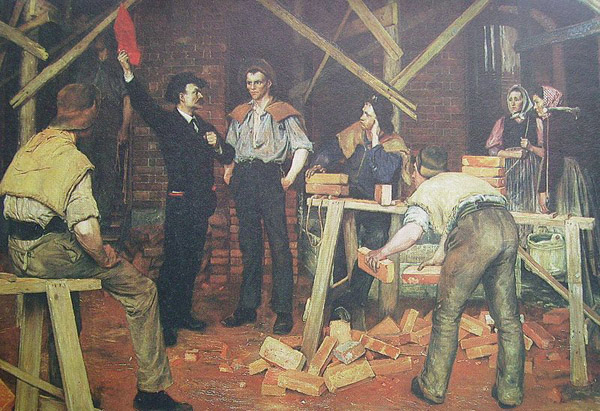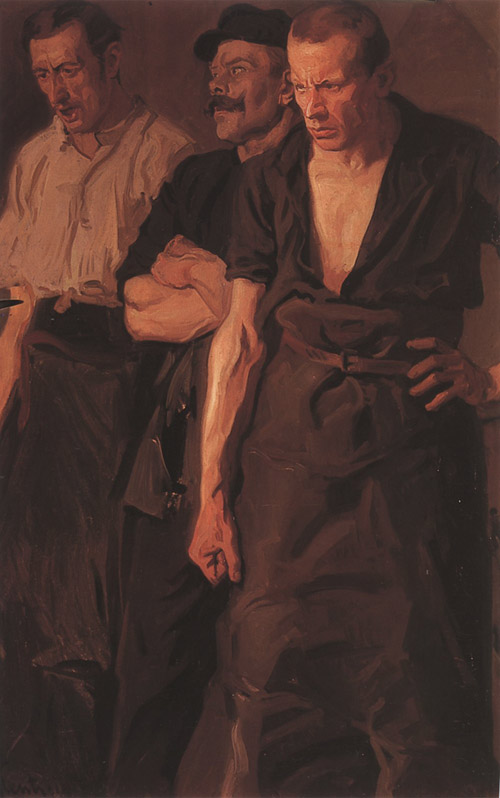|
|||||||||||||
|
An Encouragement By Punkerslut
The Cause of Agitation
To inform a person of society's injustices, and to inspire them to change these injustices, are two completely different actions. One case requires only knowledge and a listening ear. The other needs passion and those who truly have a benefit in resisting government and Capitalism. The first gives ideas, the second gives motivation to those ideas. In one and the single act, it is typical to find someone who wants to inform and agitate -- who is ready to provide the facts and the reasons for acting upon those facts. But often, the person listening is not completely ignorant to social conditions, so it may not simply be an issue of knowledge. Instead, the issue may be providing new values and ideals so that the individual will more critically react to the system they live in. It may simply be an issue of how to agitate the mass of individuals that make up society. Two individuals, a conservative and a revolutionary, may both be completely aware of a foreign war started by their nation. They may have access to the same facts and figures, the same news coverage, and the same photographs. There is no real lack of ignorance on the part of the conservative -- except ignorance of why they should be agitated. Both individuals are aware of the profits that companies exploit out of workers, the taxes that governments lay upon its people, and the various restrictions in life that arise from these two institutions. In their daily life, they experience very different parts of town, knowing the whole time what the other side looks like. What may really be lacking, that composes the difference of the revolutionary and the conservative, is the viewpoint. And when this viewpoint comes into conflict with powerful forces in the world, the individual becomes agitated by their powerlessness, and that of their entire class. When the individual believes in peace and equality, but must face war and inequality, their discontent will grow and deepen. Education is to inform, but agitation is to give meaning to that information. The skilled agitator, then, will see themselves as those they are communicating with -- and they will try to turn what everyone knows into something that they can envision in common.
To the patriot who supports war, an agitator might say, "Do you not know that your families and communities are sacrificing their children to this slaughter? Do you not realize that this war is only making the people here unsafer, since it is stirring cause for vengeance abroad? Do you not know that the poor wage-earners die in the front lines, while the rich wage-payers receive contracts for land development and arms production? Do you not understand that those people dying 'over there' are just like you, with veins that pump blood like yours and a mind that feels like yours? Do you not see that the media, owned by the wealthy, has been patriotic to only to lead you into battle, so that you can die for their profits? Do you not realize that every previous war of this developed nation has only resulted in recreating dictatorship over there, and that we are not 'fighting for democracy'?" Agitation is not simply the providing of facts, but it is the meaningful interpretation of them. It is to impassion and inspire -- to open the eyes of the soul to what the mind has been seeing the whole time. The agitator does not simply deliver a message, but convinces their audience of the meaning and value of it. And for revolutionaries, agitation is the most powerful tool. As they have been able to stir up millions, not to follow any particular command, to act for themselves. The Russian Revolution, whether from 1905 or 1917, was like that of the French Revolution, whether from 1789 or 1871. In both instances, the people had been agitated to the point of overthrowing the command of the military and the police. The role of education should not be forgotten, though. There are many who have not been able to conceptually grasp the reality given to them by mainstream media. They have not been able to connect casualty statistics with faces of the dead or profits with the exploited families of underdeveloped nations. Though they may know technically what may be happening, what they think may be so far away from truth as to make it lies. A regular news press, pamphleteering, and constant demonstration are brilliant methods of providing education. On their own, though, they are not entirely sufficient to provoke agitation. They provide an outlet toward education, but they still must find a way to reach into the hearts of the people.
The Process of De-Agitation
In carrying on the agitation, the agitator must know that they are following their natural instincts in the self-preservation of what is decent, just, and good. This is what has brought the active individual to bringing the revolution to the minds of their companions. The revolutionary was, at one point, very agitated by the pains of the system imposed upon them; and this is why they share and bring the sentiment of resistance toward all that they can. It is as natural as the ancient communication between tribes, where a single conversation meant that one village had the invention of fire while the other received the invention of the wheel. And, in more modern times, we know Gandhi translated Tolstoy into Indian to foster resistance against the British, just as Anarchists today struggle to translate so many unheard-of works from French, Spanish, Russian, and Italian. But if the spread of these ideas is natural and tends towards the improvement of the human character, why is there so much resistance to the idea of revolution? If agitation under domination and authority is natural to humanity, then why are agitators turned away or ignored? Even among those who have the most to benefit from the revolution often appear revolted or enraged at these new ideas. For the most part, it is because humans, like animals, behave as they have been trained. In the words of George Orwell, "...I saw a little boy, perhaps ten years old, driving a huge carthorse along a narrow path, whipping it whenever it tried to turn. It struck me that if only such animals became aware of their strength we should have no power over them, and that men exploit animals in much the same way as the rich exploit the proletariat." (1947 Preface to "Animal Farm.")
"Tradition," is it might be called, simply means an identity for many of those who are resistant toward revolutionary change. It may be a religion, as Catholicism has always preached against any philosophy of Socialism or reform. It may be a respect for craft or trade, like share-cropping in Italy and Spain, or the Caste system in India where your occupation is determined on birth. In these systems, people are attached to a form of life that actually represents their own oppression and exploitation. They have grown fond of their lords and masters, appreciating the few advantages that they receive from their employment. More than that, it develops as a rooted culture in the mind of the individual. It would be difficult for a person to change how they lived, when it is the way in which they have been raised by their families -- when it is the mode of existence that has been around for centuries. The ethics of workmanship, subservience, and employment are natural where a person must interact with the employer, but must not necessarily interact with other employees. The adopted tradition, whether it is from religion or family or national history, is cherished -- so much, that the individual will not regard their own exploitation or subjugation as painful. They will accept it as a badge of honor or courage, and while they cherish their ancient and traditional lifestyle, they do not see the palaces of dictators and aristocrats that they are building. They are not always appealed by the argument that humanity was free for millions of years before government, which has lasted only for thousands of years. In fact, some are so impassioned by their religion, that they still genuinely believe the world to be only a few thousand years old. By teaching the young to love their traditions and to accept those on top of them, communities are building the weapons that threaten themselves: unemployment, crime, environmental destruction, political corruption, imperialism, and war. Agitation is exchanged for gratefulness -- desire for liberty is exchanged for fear of new ideas. The greatest disposition to politics of the individual, in fact, may very well be their earliest, family influences. But even this has not been able to stop the "tamed and controlled" societies from exploding into wild, spontaneous, unexplainable, and unpredictable revolutions.
De-agitation of the individuals in the mass of people can be accomplished in other ways. If agitation is a meaningful interpretation of our present condition, then Capitalist media is a meaningless interpretation of it. By reporting the facts, news outlets are allowed the opportunity to interpret them. They each have done as much as possible to make it appear as though there is no interpretation, and they only have the interest of expressing the most unbiased truth. But this is no more impressive than kings who award themselves medals for accomplishments. It is an outgrowth of the original illusion, that the television stations and newspapers are owned by a very few people. By having a monopoly on what people hear, read, and see, they are led towards corruption. They do not exchange their service to corporations to help their image, so much as they are simply bought up outright by massive conglomerations -- like AOL Time-Warner, CNN, NBC, or CBS. Their own message reaches the people, and lets them know that society is organized in their interest. Most politicians are honest, most cops are fighting for justice, most Capitalists are trying to create employment. De-agitation occurs, because they are trying to miseducate the people into believing that since nothing better is possible, it is not worth fighting for something new.
To Be an Agitator
The explosion of people waking up and realizing the truth is far more powerful than the blast from any bomb. To be an agitator, then, can be far more meaningful in terms of the Revolution than any soldier or general. One cannot be the deliverer of the liberty for the people -- but one can try to make the people their own deliverers of freedom. If there is a formula that can determine exactly when the people are going to rise and overthrow their oppressive government, the activity of the revolutionaries must necessarily be one of the most important variables. The idea of something new cannot spread, unless there is someone to spread it. The thought of revolt, the criticism of the established order, and the morality that teaches it is wrong -- all of this must be spread through the people to bring revolution to its height. And no one particular agitator will have to declare the Revolution, as though inaugurating a new nation. The Revolution will declare itself. The role of the agitator is to provide a meaningful framework to the world in which the mass of individuals live. This may include education as much as propaganda, cooperative efforts as much as inclusive organizations. It is spreading the idea by word as by deed -- to express justice and peace through ideas, and then to express this equality and harmony through action. The agitator has many roles, as teacher and speaker, friend and companion. It is the greatest thing to agitate another person to the point where they are inspired throughout their entire body with the belief of liberty.
But the agitator cannot expect wild things to happen overnight. They cannot believe that it only takes communicating with one or two people, when entire masses are oppressed. Nor should they be so depressed and hopeless when their first attempts do not produce results. The people have experienced such a thorough de-agitation by the established powers of politics and economics. People do not identify themselves with all others who are oppressed or suffering; they associate themselves with the glories and the tragedies that may befall a group based on nation, religion, ethnicity, or culture. It is against this powerful barrier that agitators must be able to pierce through and break. Similarly, the agitator should be conscious that optimism and idealism are not always received very well by the people -- even when it is an enthusiasm for their rights of liberty, opportunity, and well-being. The revolutionary must approach the people on their own terms, speaking of how the revolution directly relates to their everyday life. The agitator should not begin with abstract thoughts and unusual concepts. But rather, they should point out how today's social order does not serve the needs of its people. They should inflame the spirit with a disdain of the inequality and poverty that exists in our world. There can be no revolution, without agitators. But agitation itself naturally rises up from any oppression or exploitation. Those who have decided to struggle for a new world are awakened while in their chains and shackles. Tyranny itself breeds its own resistance, and agitation is natural to any exploited group of people. With oppressors and masters, agitators naturally come into existence. Yet, it is up to the group of those involved in agitation that the success of the Revolution will depend. For the people must be filled with inspiration that drives them against any form of domination and slavery.
Punkerslut,
|





